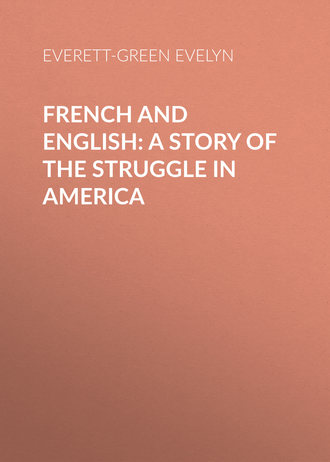 полная версия
полная версияFrench and English: A Story of the Struggle in America

Evelyn Everett-Green
French and English: A Story of the Struggle in America
Book 1: Border Warfare
Chapter 1: A Western Settler
Humphrey Angell came swinging along through the silent aisles of the vast primeval forest, his gun in the hollow of his arm, a heavy bag of venison meat hanging from his shoulders.
A strange, wild figure, in the midst of a strange, wild scene: his clothes, originally of some homespun cloth, now patched so freely with dressed deerskin as to leave little of the original material; moccasins on his feet, a beaver cap upon his head, his leather belt stuck round with hunting knives, and the pistol to be used at close quarters should any emergency arise.
He was a stalwart fellow, as these sons of the forest had need to be-standing over six feet, and with a muscular development to match his stately height. His tawny hair had been darkened by exposure to hot suns, and his handsome face was deeply imbrowned from the influences of weather in all seasons. His blue eyes had that direct yet far-away look which comes to men who live face to face with nature, and learn to know her in all her moods, and to study her caprices in the earning of their daily bread.
Humphrey Angell was not more than twenty years of age, and he had lived ten years in the forest. He had come there as a child with his father, who had emigrated in his young life from England to the settlement of Pennsylvania, and had afterwards become one of the scattered settlers on the debatable ground between the French and English borders, establishing himself in the heart of the boundless forest, and setting to work with the utmost zeal and industry to gather round himself a little farmstead where he could pass his own later years in peace, and leave it for an inheritance to his two sons.
Humphrey could remember Pennsylvania a little, although the life in the small democratic township seemed now like a dream to him. All his interests centred in the free forest, where he had grown to manhood. Now and again a longing would come upon him to see something of the great, tumultuous, seething world of whose existence he was dimly aware. There were times in the long winter evenings when he and his brother, the old father, and the brother's wife would sit round the stove after the children had been put to bed, talking of the past and the future. Then old Angell would tell his sons of the life he had once led in far-away England, before the spirit of adventure drove him forth to seek his fortune in the New World; and at such times Humphrey would listen with eager attention, feeling the stirrings of a like spirit within him, and wondering whether the vast walls of the giant forest would for ever shut him in, or whether it would be his lot some day to cross the heaving, mysterious, ever-moving ocean of which his father often spoke, and visit the country of which he was still proud to call himself a son.
Yet he loved his forest home and the free, wild life he led. Nor was the element of peril lacking to the daily lot-peril which had not found them yet, but which might spring upon them unawares at any moment. For after years of peace and apparent goodwill on the part of the Indians of the Five Nations, as this tract of debatable land had come to be called, a spirit of ill will and ferocity was arising again; and settlers who had for years lived in peace and quietness in their lonely homes had been swooped down upon, scalped, their houses burnt, their wives and children tomahawked-the raid being so swift and sudden that defence and resistance had alike been futile.
What gave an added horror to this sudden change of policy on the part of the Indians was the growing conviction throughout the settlement that it was due to the agency of white men.
France, not content with the undisputed possession of Canada, and of vast tracts of territory in the west and south which she had no means of populating, was bitterly jealous of the English colony in the east, and, above all; of any attempts which it might make to extend its western border.
Fighting there had been already. Humphrey had heard rumours of disasters to the English arms farther away to the south. He had heard of Braddock's army having been cut to pieces in its attempt to reach and capture the French Fort Duquesne, and a vague uneasiness was penetrating to these scattered settlers, who had hitherto lived in quietness and peace.
Perhaps had they known more of the spirit of parties beyond their limited horizon, they would have been more uneasy still. But habit is an enormous power in a man's life. Humphrey had gone forth into the forest to kill meat for the family larder three or four days in the week, in all seasons when the farm work was not specially pressing. He came back day by day to the low-browed log house, with its patches of Indian corn and other crops, its pleasant sounds of life, the welcome from the children, the approval of father and brother if the day had been successful, and the smiles of the housewife when he displayed the contents of his bag. It was almost impossible to remember from day to day that peril from the silent, mysterious forest threatened them. They had lived there for ten years unmolested and at peace; who would care to molest them now?
And yet Humphrey, who knew the forest so well-its mysterious, interminable depths, its trackless, boundless extent, rolling over hill and valley in endless billows-he knew well how silently, how suddenly an ambushed foe might approach, spring out from the thick, tangled shelter to do some murderous deed, and in the maze of giant timber be at once swallowed up beyond all danger of pursuit.
In the open plains the Indian raids were terrible enough, but the horrors of uncertainty and ignorance which enveloped the settlers in the forests might well cause the stoutest heart to quail when once it became known that the Indians had become their enemies, and that there was another enemy stirring up the strife, and bribing the fierce and greedy savages to carry desolation and death into the settlements of the English colonists.
Whispers-rumours-had just begun to penetrate into these leafy solitudes; but communication with the outside world was so rare that the Angell family, who had long been self-supporting, and able to live without the products of the mother colony away to the east, had scarcely realized the change that was creeping over the country. The old man had never seen anything of Indian warfare, and his sons had had little more experience. They had been peaceful denizens of the woods, and bore arms for purposes of the chase rather than for self-preservation from human foes, as did the bulk of those dwellers in the woods that fringed the western border of the English-speaking colony.
"We have no enemies; why should we fear?" asked Charles, the elder brother, a man of placable temperament, a fine worker with the axe or plough, a man of indomitable industry, endurance, and patience, but one who had never shown any desire after adventure or the chances of warfare. He was ten years older than Humphrey; and the brothers had two sisters now married and settled in the colony. The younger brother sometimes talked of visiting the sisters, and bringing back news of them to the father at home; but Charles never desired to leave the homestead. He was a singularly affectionate husband and father, and had been an excellent son to the fine old man, who now had his time of ease by the hearth in the winter weather, though during a great part of the year he toiled in the fields with a right good will, and with much of his old fire and energy.
Humphrey was nearing home now, and started whistling a favourite air which generally heralded his approach, and brought the children tumbling out to meet him in a rush of merry welcome. But there was no answering hubbub to be heard from the direction of the house, no patter of little feet, no lowing of kine.
Humphrey stopped suddenly short in his whistling, and bent his ear forward as though to listen. A faint, muffled, strangled cry seemed to be borne to his ears. Under his bronze his face suddenly grew white. He flung the heavy bag from off his back, and grasping his gun more firmly in his hands, he rushed through the narrow pathway; and came out upon the clearing around the little farmstead.
In the morning he had left it, smiling in the autumn sunshine, a peaceful, prosperous-looking place, homely, quaint, and bright. Now his eyes rested upon a heap of smoking ruins, trampled crops, empty sheds; and upon a still more horrible sight-the remains of mangled corpses tied to the group of trees which sheltered the porch. It was enough to curdle the blood of the stoutest hearted, and freeze with horror the bravest warrior.
Humphrey was no warrior, but a strong-limbed, tender-hearted youth; and as he looked at the awful scene before him, a blood-red mist seemed to swim before his eyes. He gasped, and clutched at the nearest tree trunk for support. Surely, surely it was some fever dream which had come upon him. It could not, it should not be a terrible reality.
"Humphrey, Humphrey! help, help!"
It was the strangled, muffled cry again. The sound woke the young man from his trance of horror and amazement. He uttered a hoarse cry, which he scarcely knew for his own, and dashed blindly onwards.
"Here, here! This way. By the barn! Quick!"
No need to hasten Humphrey's flying feet. He rushed through the trampled fields. He gained the clearing about the house and its buildings. He reached the spot indicated, and saw a sight he would never forget.
His brother Charles was tightly, cruelly bound to the stump of a tree which had been often used for tethering animals at milking time just outside the barn. His clothes were half torn from off his back, and several gaping, bleeding wounds told of the fight which had ended in his capture. Most significant of all was the long semicircular red line round the brow, where the scalping knife had plainly passed.
Humphrey's stout knife was cutting through the cruel cords, even while his horrified eyes were taking in these details.
When his brother was released, he seemed to collapse for a moment, and fell face downwards upon the ground, a quiver running through all his limbs, such as Humphrey had seen many a time in some wild creature stricken with its death wound.
He uttered a sharp cry of terror and anguish, and averting his eyes from the awful sights with which the place abounded, he dashed to the well, and bringing back a supply of pure cold water, flung it over his brother's prostrate form, laving his face and hands, and holding a small vessel to his parched and swollen lips so that the draught could trickle into his mouth.
There was an effort to swallow, a quiver and a struggle, and the wounded man opened his eyes and sat up.
"Where am I-what is it?" he gasped, draining the cup again and again, like one who has been near to perish with thirst. "O Humphrey, I have had such an awful dream!"
Humphrey had so placed his brother that he should not see on opening his eyes that ghastly sight which turned the younger man sick with horror each time his eyes wandered that way.
Charles saw the familiar outline of the forest, and his brother's face bending over him. He had for a moment a vague impression of something unspeakably awful and horrible, but at that moment he believed that some mischance had befallen himself alone, and that he had imagined some black, nameless horror in a fevered dream.
A shiver ran through Humphrey's frame. His blue eyes were dazed and dilated. What answer could he make? He busied himself with dressing the wounds upon his brother's chest and shoulders, from which the blood still oozed slowly.
"What is it?" asked Charles once again; "how did I come to be hurt?"
Humphrey made no reply, but a groan burst unawares from his lips. The sound seemed to startle Charles from his momentary calm. He suddenly put up his hand to his brow, felt the smart of the significant red line left by the scalping knife, and the next moment he had sprung to his feet with a sharp, low cry of unspeakable anguish.
He faced round then-and looked!
Humphrey stood beside him shoulder to shoulder, with his arm about his brother, lest physical weakness should again overpower him. But Charles seemed like one turned to stone.
For perhaps three long minutes he stood thus-speechless, motionless; then a wild cry burst from his lips, accompanied by a torrent of the wildest, fiercest invective-appeals to Heaven for vengeance, threats of undying hatred, undying hostility to those savage murderers whose raid had made this fair spot into a desolation so awful.
Humphrey stood still and silent the while, like one spellbound. He scarcely knew his brother in this moment of passionate despair and fury. Charles had been a silent, placable man all his life through. Born and bred in the Quaker settlement, till he had taken to the life of the forest he had been a man of quiet industry and toil rather than a fighter or a talker. A peaceful creed had been his, and he had perhaps never before raised a hand in anger against a fellow creature.
This made the sudden wild and passionate outburst the more strange and awful to Humphrey. It was almost as though Charles was no longer the brother he had known all these years, but had been transformed into a different being by the swift and fearful calamity which had swept down upon them during these past few hours.
"I will avenge-I swear it! As they have done, so shall it be done unto them. Eye for eye, tooth for tooth, life for life-is not that written in the Scriptures? The avenger of blood shall follow and overtake. His hand shall not spare, neither his eye pity. The evildoer shall be rooted out of the land. His place shall be no more found. Even as they have done, so shall it be done unto them."
He stopped, and suddenly raised his clasped hands to heaven. A torrent of words broke from his lips.
"O God, Thou hast seen, Thine eyes have beheld. If it had been an open enemy that had done this thing, then could I perchance have borne it. If it had been the untutored savage, in his ignorant ferocity, then would I have left Thee, O Lord, to deal with him-to avenge! But the white brother has risen up against his own flesh and blood. The white man has stood by to see. He has hounded on the savages! He has disgraced his humanity! O Lord God, give him into my hands! let me avenge me of mine adversary. Let the ignorant Indian escape if Thou wilt, but grant unto me to slay and slay and slay amid the ranks of the white man, who has sold his soul for gain, and has become more treacherous and cruel than the Indian ally whose aid he has invoked. Judge Thou betwixt us, O Lord; look upon this scene! Strengthen Thou mine arm to the battle, for here I vow that I will henceforth give my life to this work. I will till the fields no more. I will beat my pruning hook into a sword. I will slay, and spare not, and Thou, O God of battles, shalt be with me. Thou shalt strengthen mine arm; Thou shalt give unto me the victory. Thou shalt deliver mine enemy into mine hand. I know it, I see it! For Thou art God, and I am Thy servant, and I will avenge upon him who has defied Thee this hideous crime upon which Thine eyes have looked!"
Humphrey stood by silent and awed. An answering thrill was in his own heart. He had averted his eyes from the ghastly spectacle of those charred and mangled corpses; but they turned upon them once more at this moment, and he could not marvel at his brother's words. He, too, had been trained to peaceable thoughts and ways. He had hoped that there would soon be an end of these rumours of wars. His immediate forefathers had been men of peace, and he had never known the craving after the excitement of battle.
Yet as his brother spoke there came upon him a new feeling. He felt his arm tingling; he felt the hot blood surging through his veins. He was conscious that were an enemy to show face at that moment between the trees of the forest, he would be ready to spring upon him like a wild beast, and rend him limb from limb without pity and without remorse.
But the Indians had made off as silently and as swiftly as they appeared. Not a vestige of the band remained behind. And there was work for the brothers at that moment of a different sort, and work which left its lasting mark upon the memory and even upon the nature of Humphrey Angell.
Together the brothers dug a deep grave. Reverently they deposited in it all that was left of the mortal remains of those whom they had loved so tenderly and well: the kindly house mother, to whose industry and thrift so much of their comfort had been due; the little, innocent, prattling children and brave little lads, who were already learning to be useful to father and mother. None of them spared-no pity shown to sex or age. All ruthlessly murdered; husband and father forced to watch the horrid spectacle, himself a helpless prisoner, waiting for his doom.
Humphrey had not hitherto dared to ask the question which had been exercising him all the while-how it was that his brother's life had been spared. He also wanted to know where the old man their father was; for the corpses they had laid in the grave were those of Charles's wife and children.
Charles noted his questioning glance around when the grave had received its victims, and he pointed to the smoking ruins of the house.
"He lies there. They bound him in his chair. They tied the babe down in his cradle. They set fire to the house. Heaven send that the reek choked them before the fire touched them! They lie yonder beneath the funeral pyre-our venerable sire and my bonny, laughing babe!"
He stopped short, choked by a sudden rush of tears; and Humphrey, flinging down his spade, threw himself along the ground in a paroxysm of unspeakable anguish, choking sobs breaking from him, the unaccustomed tears raining down his cheeks.
The brothers wept together. Perhaps those tears saved Charles from some severe fever of the brain. He wept till he was perfectly exhausted, and at last his condition of prostration so far aroused Humphrey that he was forced into action.
He half lifted, half dragged his brother into one of the empty barns, where he laid him down upon some straw. He rolled up his own coat for a pillow, and after hastily finishing the filling in of the grave, he went back into the forest for his game bag, and having kindled a fire, cooked some of the meat, and forced his brother to eat and drink. It was growing dark by that time, and the blackness of the forest seemed to be swallowing them up.
A faint red glow still came from the direction of the burning homestead, where the fire still smouldered amid the smoking ruins. Humphrey closed the door of the barn, to shut out the sight and also the chill freshness of the autumn night.
He lay down upon the straw beside his brother, worn out in body and mind. But there could be no thought of sleep for either man that night; the horror was too pressing and ever present, and anguish lay like a physical load upon their hearts.
The silence was full of horror for both; in self defence Humphrey began to speak.
"When was it, Charles? I was in the forest all day, and I saw and heard nothing. The silence was never broken save by the accustomed sounds of the wild creatures of the wood. No war party came my way. When was it?"
"At the noontide meal. We had all gathered within doors. There was none to give warning of danger. Suddenly and silently as ghosts they must have filed from out the forest. We were already surrounded and helpless before the first wild war whoop broke upon our ears!"
Charles put up his hands as though to shut out that awful yell, the echoes of which rang so long in the ears of those who had heard it. Humphrey shivered, and his hands clinched themselves nervously together.
"Why was I not here to fight and to die?"
"Better to live-and to avenge their blood!" answered Charles, with a gleam lighting his sunken eyes. He was silent awhile, and then went on with his narrative.
"It was not a fight; it was only a slaughter! The children rushed screaming from the house, escaping the first rush of the painted savages when they burst in upon us. But there were others outside, who hacked and slashed them as they passed. I had only my hunting knife in my belt. I stood before Ellen, and I fought like ten demons! God is witness that I did all that one man could. But what avail against scores of such foes? Three corpses were heaped at my threshold. I saw them carrying away many others dead or wounded, Our father fought too; and Ellen backed into the corner where the gun stood, and with her own hands she shot down two of the savages.
"Would to heaven she had shot at the white one, who was tenfold more of a fiend! But he shall not escape-he shall not escape! I shall know his face when I see it next. And I will not go down to the grave till he and I have stood face to face once more, when I am not bound and helpless, but a free man with weapons in my hand. That day will come; I read it in the book of fate. The Lord God, unto whom vengeance belongeth, He will cause it to come to pass!"
Humphrey was afraid of these wild outbursts, as likely to bring on fever; and yet he could not but desire to know more.
"A white man? Nay, brother; that is scarce to be believed. A white man to league himself to such deeds as these!"
"A white man-a Frenchman. For I called upon him in our tongue, and he answered me in the same, but with that halting accent which I know belongs to the sons of France. Moreover, he made no secret of it. He called us dogs of English, who were robbers of the soil where none had right to penetrate save the subjects of his royal master. He swore that they would make an end of us, root and branch; and he laughed when he saw the Indians cutting down the little ones, and covering their tender bodies with cruel wounds; nor had he any pity upon the one white woman; and when I raved upon him and cursed him, he laughed back, and said he had no power to allay the fury of the savages. Those who would preserve themselves safe should retire within the bounds of the colony to which they belong. France would have an end of encroachment, and the Indians were her friends, and would help her to drive out the common foe!"
Humphrey set his teeth and clinched his hands. The old instinctive hatred of centuries between French and English, never really dead, now leaped into life in his breast. He had heard plenty of talk during his boyhood of France's boundless pretensions with regard to the great New World of the West, and how she sought, by the simple process of declaring territory to be hers, to extend her power over millions of miles of the untrodden plains and forests, which she could never hope to populate. He had laughed with others at these claims, and had thought little enough of them when with father and brother he set out for the western frontier.
There was then peace between the nations. Nor had it entered into the calculations of the settlers that their white brethren would stir up the friendly Indians against them, and bring havoc and destruction to their scattered dwellings. That was a method of warfare undreamed of a few years back; but it was now becoming a terrible reality.
"But your life was spared?" said Humphrey at last; "and yet the scalping-knife came very close to doing its horrid work."
"Yes: they spared me-he spared me-when he had made me suffer what was tenfold worse than death; yet I wot well he only thought to leave me to a lingering death of anguish, more terrible than that of the scalping knife! They knew not that I had any to come to my succour. When he drew off the howling Indians and left me bound to the stump, he thought he left me to perish of starvation and burning thirst. It was no mercy that he showed me-rather a refinement of cruelty. I begged him to make an end of my wretched life; but he smiled, and bid me a mocking farewell.
"Great God of heaven and earth, look down and avenge me of mine adversary! I trust there are not many such fiends in human shape even in the ranks of the jealous and all-grasping French. But if there be, may it be mine to carry death and desolation into their ranks! May they be driven forth from this fair land which they have helped to desolate! May death and destruction come swiftly upon them; and when they fall, let them rise up no more!"









